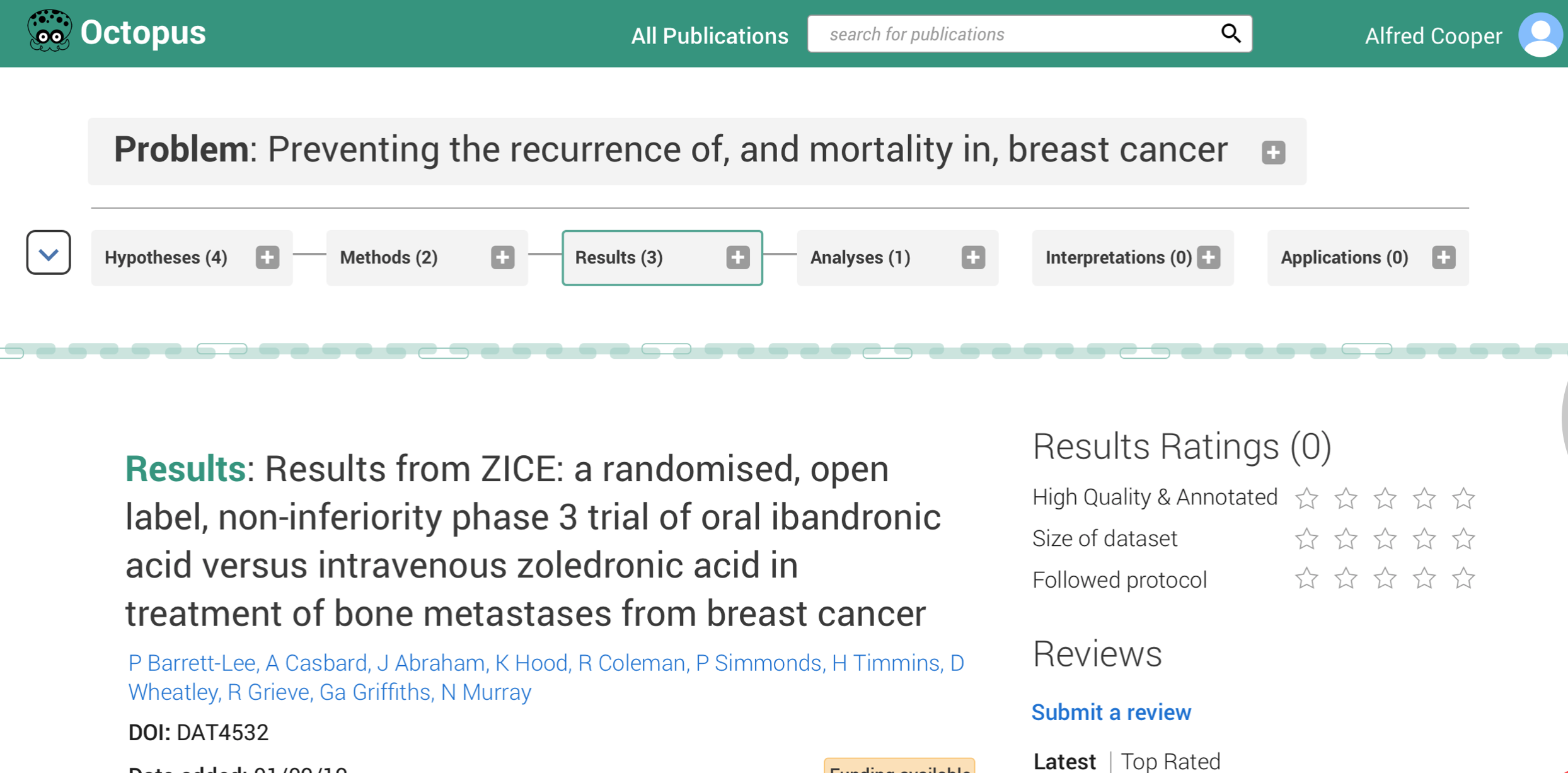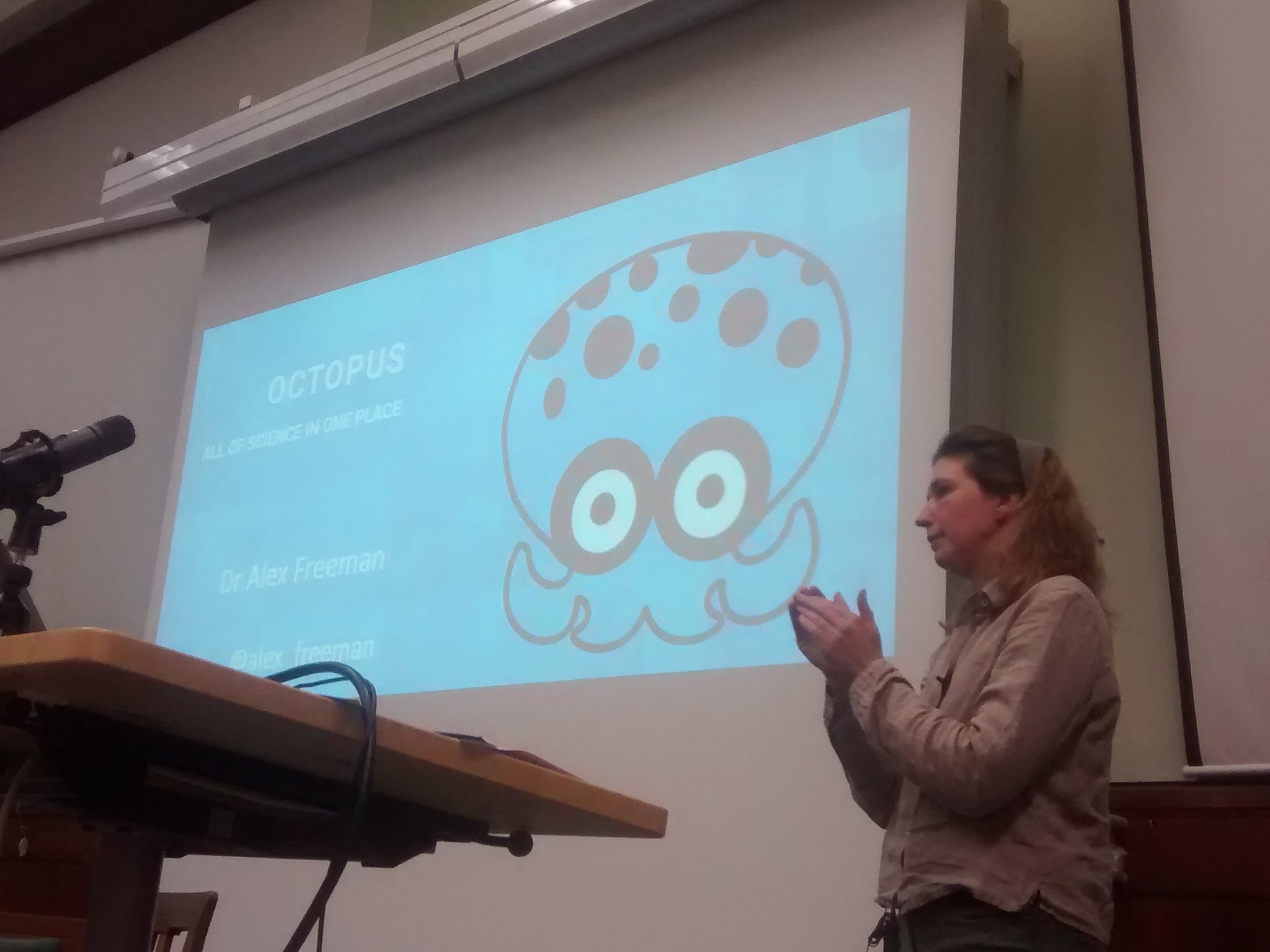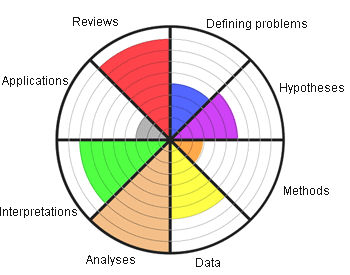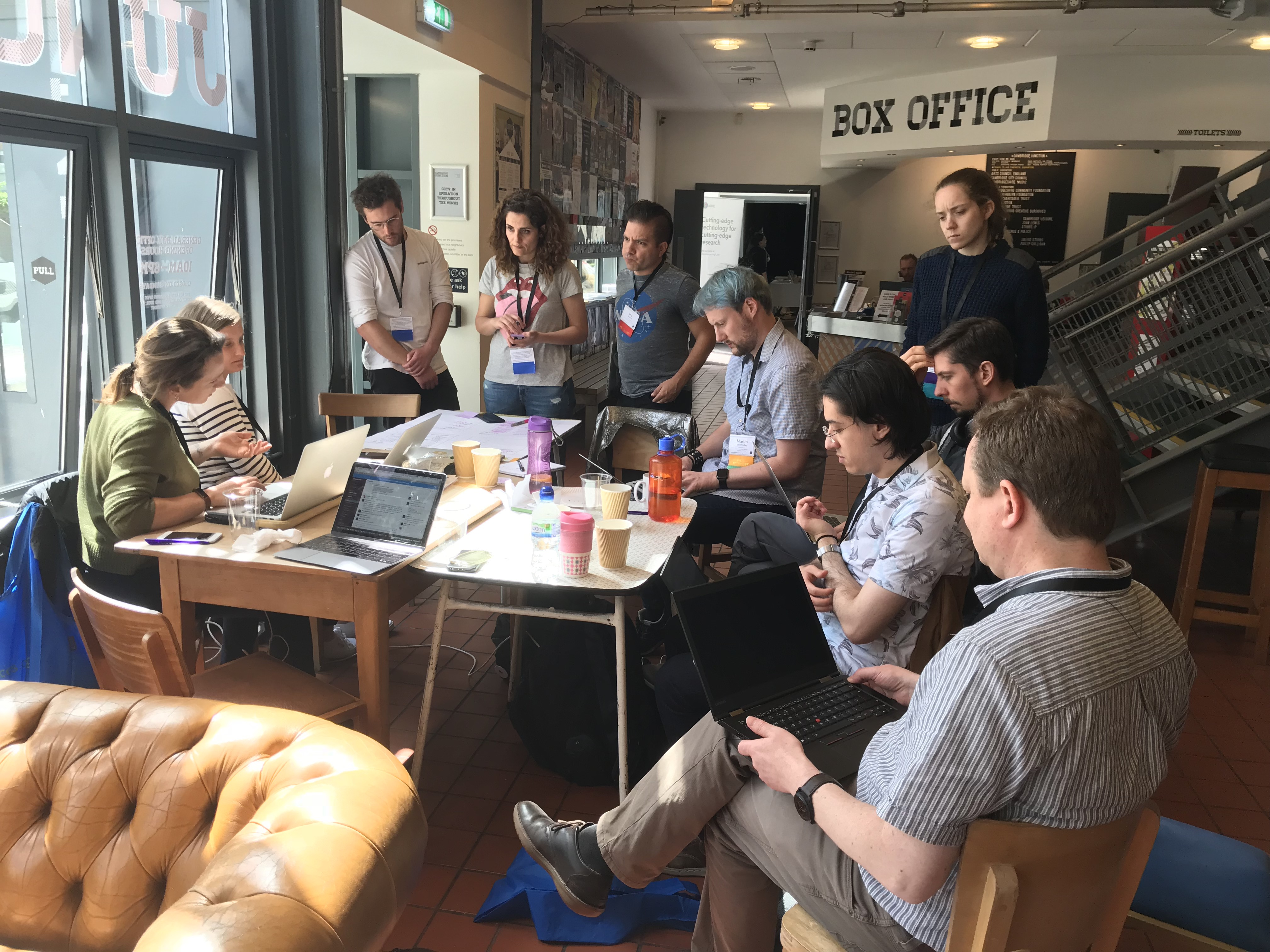-
Octopus: preparing for launch
 Continue reading
Continue readingAgain I must apologise that I’ve not been keeping this blog up to date. Octopus has grown hugely in the last year or so and is about to launch as a full, working platform - funded by the UKRI, and in partnership with Jisc and the UK Reproducibility Network (UKRN).
-
Octopus: full user-testing
 Continue reading
Continue readingI’m so sorry that I haven’t been updating this blog! Octopus has, as you may have noticed, grown in functionality and beauty with a lot of work from technical achitect Vot and the software company WinGravity.
The coronavirus pandemic hit just as we were sending out links to the prototype for people to test, which was difficult timing. On the other hand, the pandemic has really brought sharply into focus the need for reform of the scientific publishing system. I have wanted to shout ‘Octopus is here for these very reasons!’ very loudly from the rooftops, but have also been extremely busy in my day-job helping respond to the pandemic.
-
Octopus: the prototype approaches the next user-testing phase
 Continue reading
Continue readingThe prototype that the team from Imperial College built has been taken to the next stage by the lovely software engineering team at company WinGravity.
Wingravity have added the ability for people to rate publications and increased the functionality of the upload mechanism so that publications can now be uploaded as .docx documents. The text, images and tables are then all converted to html, so that the authors can tweak the formatting if required before publishing. This makes Octopus already a much more flexible and user-friendly publication platform than most commercial journals. No need for tedious and expensive proof-reading or reformatting.
-
The Octopus build begins!
 Continue reading
Continue readingIt’s been a long time since I updated the blog, for which I must apologise - but so much has been happening!
Thanks to an award from Mozilla Science the build of a working version of Octopus has begun. Actually, though the first work has been done by a extraordinarily talented group of computer science students from Imperial College London who have been working hard on Octopus as part of their degree course.
-
Octopus goes into partnership with the UK Reproducibility Network
 Continue reading
Continue readingOctopus and the UKRN
Enabling, encouraging and rewarding good scientific practice is the principle at the heart of Octopus. In the UK a new consortium, the UK Reproducibility Network has just been set up. The UKRN comprises representatives from research establishments (both academic and industry) as well as from major funders and journals, all working together to support initiatives that encourage and aid good research practices in the UK as well as research how best to do this.
Since Octopus and the UKRN share principles, we have joined in a partnership that recognises this. UKRN will help support the dissemination of Octopus as a concept (and hopefully soon as a platform). This partnership does not infringe on the autonomy or intellectual property of either Octopus or UKRN. I am delighted and honoured to be part of this partnership and look forward to working with the UKRN.
You can follow the UKRN on Twitter.
-
Octopus Mock-ups finished
 Continue reading
Continue readingMock-ups of Octopus are completed!
Thanks to the award that Octopus won at the Royal Society, I was able to commission Science Practice to create a series of mock-ups of what Octopus’ user-interface might look like, and how the major features would actually work (as far as the user experience goes). Now those mock-ups are finished and ready for feedback!
Working with the team at Science Practice was incredibly useful. I had met them at the eLife sprint in ay 2018, when this website and the real work on Octopus began, so they were the natural place to go for more help. Having to think through how every feature I had imagined for Octopus would actually function was a very good exercise - as well as deciding what its key features were that I would want to demonstrate through the mock-up.
-
The next stages for Octopus
 Continue reading
Continue readingSuccess for Octopus at the Royal Society
On 2nd November 2018, I pitched Octopus to the Royal Society in London as part of their 'Improving Research Culture' event pitching competition. It won both the public vote and the judges', and I was also overwhelmed by the positive response from people Octopus at the event and afterwards. What perhaps surprised me most was that the judge who chose to give me the award was Magdalena Skipper, the Editor-in-Chief of Nature, who said that she and many other journal editors agreed that this sort of change was necessary (I had indeed previously already heard the same sentiment from the Editor-in-Chief of the BMJ and been taken aback then). The whole event was galvanising.
The award was £1000, which I am spending - as I said in my pitch - on some time with user-interface designers Science Practice, who worked on the original designs for Octopus pages at the eLife Sprint in May. We will produce more, detailed page layouts and wireframe walk-throughs to show exactly how Octopus will look and behave. This will allow me to do some initial user-testing, to make sure that it suits the needs of researchers across different disciplines, and also will act as templates to give to software engineers to build
-
How could Octopus break the status quo?
 Continue reading
Continue readingHow Octopus might start up and change the status quo in scientific publishing
Most people agree that the idea behind Octopus is a good one, and also that it is technically achievable. Many, though, fear that it will not work in reality because the status quo in science is so well established. Journals are hugely profitable commercial enterprises and hence naturally resistant to any change that will undermine that. Scientists are judged almost exclusively on how many papers they publish and in which journals (ranked by 'reputation') and so anyone stepping outside of that established system and publishing in a place other than an accepted journal risks that work not being recognised by academic recruitment and promotion panels. Science funders have some influence, because they literally hold the purse strings and so can stipulate that in order to obtain funding, researchers must publish their work in a certain way or in a certain place. Academic institutions who hire and promote scientific researchers can also wield power by making clear how they will assess candidates.
Out of these players in the game, then, where are the incentives to change the scientific publishing system so radically as to move to something like Octopus? I'll go through each in turn and outline why I think they would see an advantage and how they could shift from one system to another in a practical sense.
-
Fixing Science
 Continue reading
Continue readingWhat is wrong in science and what Octopus can do to help
Those working in science today recognise a whole host of problems. Octopus aims to tackle many of these through changing the way that science is published.
I trained as a biologist, but then spent my career in the media. When I came back to academia in October 2016 I was really shocked to see how much the incentive structure in sciennce was driving researchers to become - essentially 'journalists'. Scientists and their work are judged almost exclusively on how many papers they can get published in journals and how many people read them, just like journalists. But this isn't the way to reward good scientific work. In fact, it often rewards exactly the opposite. So I see a complete overhaul of the scientific publishing system as the only way to start rewarding good scientific practice, and to encourage a collaborative, efficient, and therefore more successful and meritocractic global endeavour.
-
Octopus @ eLife Sprint
 Continue reading
Continue readingTwo days of incredible teamwork
What an intense couple of days! Since eLife Sprint kicked off yesterday morning, 60 participants have formed small and diverse groups and worked on their open science projects. We’ve seen some amazing progress in the last 48 hours - from the inception of ideas to website and application design to content creation. Our 12-person team (including software developers, researchers, science communicators, UX designers, and publishers) has been working hard on creating a comprehensive tool to change the way scientific publishing is done.
-
Octopus is born
 Continue reading
Continue readingWelcome to the Octopus project!
The idea of Octopus is to create a one-stop place for all scientific research… Freely open to all and language agnostic.
Thinking ‘what would we want science to look like if we started again?’ Octopus is designed to be a community-owned platform, using several Open publishing tools already developed and encouraging others to develop more to make it serve the needs of science.